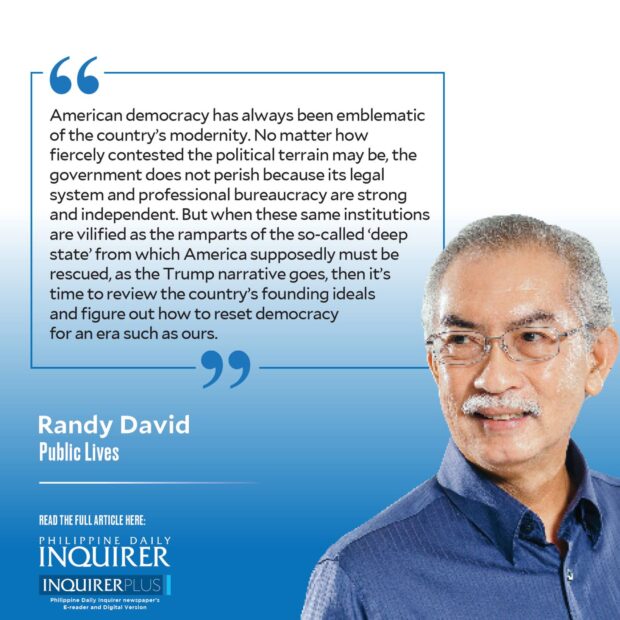America’s flirtation with one-man rule

With the indictment of former United States president Donald Trump on Aug. 1, for his unlawful attempts to overturn the election results and interfere with the orderly transfer of power following the 2020 presidential election, America has moved closer to making a decision that will either save its democratic system or finally tear it apart. After pleading not guilty to these charges, Trump will be tried before a federal grand jury in a US District Court in the District of Columbia. The first hearing is set for Aug. 28.
The meticulously crafted indictment, written by a team led by Jack Smith, the special counsel appointed by the US attorney general, draws heavily from the voluminous documents and interview transcripts accumulated by the Congressional Select Committee that was formed to investigate the Jan. 6, 2021 assault on the US Capitol. Yet, interestingly, the charges against the former president do not include inciting to insurrection, which, if proven, would have permanently barred Trump from running for public office.
Legal analysts say that any mention of insurrection or rebellion might only complicate the case as it would most certainly trigger the first amendment on free speech. Defense attorneys could argue that while the then president did give a political speech, which was his right, to say that he told his supporters to assault the US Capitol would not be easy to prove.
The indictment instead explicitly accuses Trump of conspiracy to defraud American voters of their legitimate votes, with the participation of six co-conspirators, who, for now, remain unnamed and uncharged. The case zeroes in on Trump’s specific role in this alleged scheme not just to cast doubt on the integrity of the election results, but to alter them unlawfully.
One can appreciate Smith’s desire to speed up the legal process and obtain a federal court decision before the 2024 presidential election. But time may not be on his side. After his arraignment last Thursday, Trump defiantly labeled the legal proceedings as a persecution and a witch hunt aimed at stopping his return to the Oval Office. This early, his attorneys are expected to challenge the jury’s composition, and to ask for a change of venue, away from the District of Columbia, to somewhere less hostile to Trump, like West Virginia. These side issues may take a while to resolve.
Meanwhile, even as the actual primaries have yet to begin, the opinion surveys have been tracking the popularity of potential nominees for the Republican Party’s presidential candidate. All the polls show Trump leading the pack by a wide margin that is unprecedented in US primaries, proof enough that he is in perfect sync with the world view of the Republican voter base.
It’s difficult to see how the prosecution can steer clear from the political waters into which Trump and his supporters seek to submerge this case. Nothing can conceivably stop him from running in next year’s presidential election. If he wins, everything becomes moot. If the case is unresolved by then, he could just order the suspension of all proceedings. If he is convicted, he will just pardon himself. It may not be as simple as that, but that’s how Trump’s true believers view the import of these legal proceedings — that they are all part of politics, and therefore their proper resolution lies in the 2024 election.
The one single force that would have prevented this looming catastrophic assault on the legal system from happening — the Republican Party — has chosen to bend to the willful resentments that animate its base. Trump has so captivated this base that the more reasonable figures in the Republican leadership have chosen to tone down whatever criticisms they have of the man for fear of alienating their party’s voting base. In effect, they are conceding that Trump can indeed stand above the law if he wins the presidency again. This is how dictatorships are born — often on the back of a popular vote.
Up to this point, the survey numbers offer no visible hope for an alternative within the Grand Old Party. The former president is outpolling all his rivals, so much that even if the latter united behind one of them, their combined votes would not come close to denting Trump’s dominance. At the national level, Joe Biden’s approval ratings have been abysmal. Between him and Trump, the votes are evenly split, signifying a deep politico-cultural divide within the American polity itself.
American democracy has always been emblematic of the country’s modernity. No matter how fiercely contested the political terrain may be, the government does not perish because its legal system and professional bureaucracy are strong and independent. But when these same institutions are vilified as the ramparts of the so-called “deep state” from which America supposedly must be rescued, as the Trump narrative goes, then it’s time to review the country’s founding ideals and figure out how to reset democracy for an era such as ours.




















